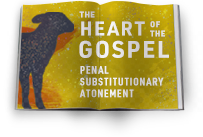20 Quotes from It Is Well: Expositions on Substitutionary Atonement
Editor’s note: You can purchase It Is Well here.
* * * * *
From time to time I’ve been asked, “Where is the cross in your church?” People look around our 1911 meeting house and find no cross there. You won’t find it in gold, silver, or wood. You won’t find it embroidered on a banner or carved in the paneling. It’s nowhere on the pulpit or on the table. Where is it? It’s there. It’s there at the heart of our church. It’s in the Bible. It’s in the sermons. It’s in the songs and the prayers. And it’s in the hearts of the people. (12)
The truth of the Word, the cross in the Bible, explodes into glorious joy at the foundation and heart of our life together as a church. When we experience that solemn joy, that deep delight, that loud celebration together, whether we’re at the Lord’s Table or simply rejoicing after confessing our sins in prayer, the cross is seen to be the center of our church. (13)
You and I need deliverance from bondage to sin and from the fatal judgment of God, and that deliverance will come only through the blood of the firstborn lamb without blemish. Just as the Passover lamb was a substitute for sinners, so too is the Lamb of God. (21)
The judgment on Egypt was a terrible preview of the judgment that is to come on all of us spiritually. God is a good God, and because of that, he will judge us. In fact, God’s judgment reminds us of his sovereignty, his goodness, and our need for a savior. How clearly do you see that? Do you see why God’s very goodness means that he must judge you? (26)
It’s amazing when you think about it that God’s meeting place with man, the place where atonement would be made, was in the very symbol of his holiness and righteousness. This room, separated physically and by rules—with the ark of the covenant, the bowing cherubim, the law written by God’s own hand—is where not only God’s righteousness and holiness but also his mercy would be shown most clearly. (38)
So this is the picture: Israel had sinned against God. And what should be done about that? How could so many people find forgiveness? Through atonement. Through the death of a substitute in their place, a sacrifice that would take the penalty due to them. And why would God teach people such a thing? Because he was preparing them to understand the great truth, as Hebrews says, that “Christ was sacrificed once to take away the sins of many people.” (41)
Jesus Christ is the true High Priest of his people. He alone has entered behind the curtain and seen God face-to-face. He has brought the blood of the Lamb, his own blood, into God’s presence, and he has done so once and for all time, never to be repeated. (48)
Do you see this amazing combination? God’s will and the servant’s willingness. This is no cosmic child abuse of a heavenly Father gone terribly wrong, abusing his trembling child who shrinks back from his Father’s strokes. This is the eternal, triune God—Father, Son, and Holy Spirit—determining from eternity past that he would deal with our sins. (55)
He [Jesus] didn’t just die on behalf of orfor the benefit of, but he literally died in their stead, or in their place. They deserved death, but because he has died for them, now they will not die. (73-74)
How can we measure the power of Christ’s death? Surely it’s sufficient for the salvation of all, if you want to ask the question that way, but it is, as the theologians say, efficient for the salvation of “many.” Christ knew those for whom he was laying down his life, and they were the same ones that the Father had elected, the ones to whom he would give the gifts of repentance and faith and who the Spirit would regenerate. (75)
Jesus died spiritually before he died physically. I do not mean that some part of the divine nature died. Nor do I mean that the Trinity itself was torn apart. Rather, I mean that on the cross Jesus Christ experienced the death that Adam and Eve experienced immediately upon their rebellion in the garden and the death that you and I are all born into. He experienced in the consciousness of the God-man what it means for God to be opposed to those who are by nature objects of his wrath. (88)
According to Jesus, that bronze serpent in the desert was just a picture of the true atonement that would be made when he was lifted up on the cross, not merely as a symbol or emblem of our judgment but as the substitute who would actually suffer our judgment in our stead. (94)
How do we know that God loves the world? We look at the cross. How do we know what God’s love looks like? We look at the cross. On the cross God gave his Son as a sacrifice for a sinful world in full-tilt rebellion against him, and the person God gave for the world wasn’t just anybody; it was his one and only Son, the incarnate Second person of the Trinity, whom the Father had loved from all eternity and with whom he was well pleased. (96)
If Jesus were an unrelated third party to God’s just complaint against us, we might have reason to balk at the apparent injustice of his substitutionary death on the cross for us. But Jesus was no disinterested observer. As the second person of the Godhead in his divinity, he stood in perfect union with God, the very one who has the complaint. As fully man in his humanity, he stands in perfect solidarity with us, being like us in every way except without sin. (111)
Sometimes people will, in ignorance, represent the Christian gospel as a loving Son persuading an unwilling Father to show mercy. But that is not what the Bible teaches. God the Father was not reluctant. He planned our salvation and initiated it. He acted. It was his gift. (121)
We can only be saved from the penalty our sins deserved by the very one we’ve sinned against—God himself.” (122)
Brothers and sisters, if you are justified, you understand that it’s not that God has merely let you off because the penalty has been paid, but that there is no longer any grounds for him to condemn you. All those grounds have been met and exhausted by Christ. Therefore, do not live trembling on the verge of hell. Live trembling on the verge of heaven, knowing that there is no longer any charge to be made against you, because Christ has taken it all. (123)
Jesus Christ came to save us. He came to save us from ourselves and from our own self-made disaster of a life. Most fundamentally, he came to save us from himself, from God’s sure wrath against us for our sins—sins that hurt us and others, sins that divide and destroy, sins that dishonor the God who made us. (173)
The contrast is striking. We deserve the curse. He did not. We could not escape the curse on our own. He took it on voluntarily. We are born into the curse and daily confirm the rightness of it. He had to become a curse, for it had no natural hold on him. But the most important contrast is that we could never satisfy the curse. We, in fact can never be punished as much as our sins deserve. But he not only satisfied the curse; he exhausted it. (189)
God is the ultimate focus of Christ’s death on the cross. Yes, Jesus died for sins and for unrighteousness, but ultimately Jesus died for God and his glory. For when Christ brings us to God, he brings us into a right relationship with God. It’s as if the universe is set back where it should be—a relationship in which he is the center and we orbit around him in a safe proximity and nearness, a relationship in which his glory is the point and we find our joy and meaning in being a display of his worth rather than our own. (215)










